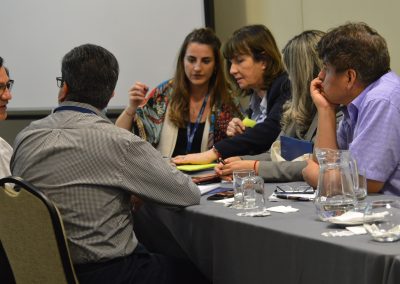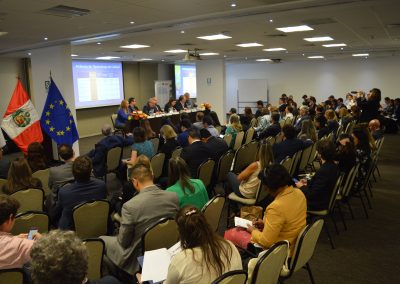How to bring work and training together for youth employability
Representatives of labour ministries, national training institutes, business organizations, trade unions and civil society organizations from Europe and Latin America and the Caribbean, as well as international organizations, met on April 1 and 2 in Lima, Peru, at the seminar “Promotion of Youth in Companies”, to think about how to improve employment policies and youth employability.
The seminar, organized by the European Union EUROsociAL+ programme and the EU-LAC Foundation, in collaboration with the Ministry of Labour and Employment Promotion of Peru, the International Labor Organization (ILO) and the Inter-American Center for the Development of Knowledge in Vocational Training (CINTERFOR-ILO) also had the participation of SOCIEUX+, through its Labour and Employment area.
During the inauguration, the Minister of Labour and Employment Promotion, Sylvia Cáceres Pizarro, said that “public policy responses are needed” to address the problem of youth unemployment and the informality of labour, with the latter figure at 72% in Peru, which causes “the invisibility of workers”, implying a lack of protection, an absence of labour rights “and of all our resources as an effort from different countries for social cohesion”.
On the part of the European Union, the Ambassador to Peru, Diego Mellado, stressed that the presence of multinationals in the country – which he said already account for half of foreign investment – plus bilateral free trade agreements with social standards, should be translated into “a market of 510 million European consumers that can have a positive impact on the employability and training of young people”.
The objective of promoting quality jobs with better remuneration, in order to have an impact on social welfare, is precisely one of the approaches to education and professional training. Juan Manuel Santomé, director of EUROsociAL+, explained that “in the region, youth unemployment triples that of the adult population. One in five young people look for work and can’t find it”, while in the European Union the average is around 15%.
“Among the most successful policies for youth employment are those that combine classroom training with training where the job is carried out at work”, also having “a real work contract that recognizes the rights and duties of young people”, points out Santomé. In addition, he argues that “countries that have developed systems that integrate training and work are those that have better results in youth employment, and the bet is that there is involvement of companies,” which would be encouraged to participate when they perceive that these programmes mean investment for their growth.
Innovative experiences in training and work
The seminar was preceded by a call for proposals from the European Union, Latin America and the Caribbean, launched by the EUROsociAL+ Programme and the EU-LAC Foundation, to select 13 innovative experiences in education and professional training, among a total of the 100 presented.
The experiences, received by the EU-LAC Foundation, were evaluated by Matteo Colombo, researcher at the Adapt Foundation, who studied the 13 experiences of education and professional training, and who stressed that they all shared the purpose of drawing attention to unemployment and youth inactivity, and about the lack of skills or inadequacies for the labour market; while the aim was to strengthen employability, youth employment and social inclusion and development, for the benefit of businesses, young people and communities in general.
Photos courtesy of EUROsociAL+










